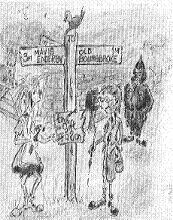I heard an appeal yesterday morning on behalf of the British Stammering Association.
Thank God, I thought, for an organisation that doesn’t feel the need (yet) to re-christen itself with some ‘positive’ one-word title, like ‘Relate’, or something meaningless like ‘Unison’.
How long, I wonder, before it becomes ‘Speak’, or ‘Fluent’, or even ‘For Christ’s Sake, Spit It Out!’
But, apart from that, I was interested because as a young teenager I was afflicted by the problem. What was I - twelve or thirteen? - when I started having trouble with d’s and t’s, p’s and s’s. In fact with every consonant.
I suppose it was something to do with puberty, compounded by a natural shyness and a murderous self-consciousness. These were the days when uncles would constantly ask if I was ‘courting’ and insinuate carnal desires on my part about any girl whose name I happened to mention.
They were right, of course. I did fancy every girl I met. (These days it’s only half of them). Perhaps they wouldn’t have teased me quite so much if they’d known that I definitely had carnal desires towards my aunts.
God, it was a terrible time. The blushing, the teasing, the boasts of friends, the guilt about self-abuse. And the c-cruel j-jokes about my b-bloody st-stammer.
I remember an English lesson at school where we were asked to differentiate between similar-sounding words. ‘If you take a train to London, is London your destiny or your destination?’ asked my teacher. ‘What do you think, Bolingbroke?’
I knew I couldn’t get ‘destination’ out without making a fool of myself and so I replied, ‘I don’t know, sir.’
I couldn’t win. I was making a fool of myself either way.
He tried me again, this time with ‘nationalisation’ and ‘naturalisation’. Same result and he gave up on me. I was mortified. I’ve always preferred to be thought foolish to stupid.
I practised difficult words. Alone, I had no problem. I discovered that singing wasn’t affected by the impediment, and tried to imagine a tune in my head when I spoke, but that didn’t work.
And then I hit on a simple solution: I could say words beginning with a vowel, and once the word was in flow the consonants that followed were no problem. ‘Aspidistra’ was easy enough; so were ‘abattoir’ and ‘entomologist’ and ‘intelligence’. If only all words began with a vowel.
So I ensured that they did. I added an ‘er’ to every word, especially the first in a sentence. ‘Er-nationalisation’, ‘er-destination’, etc. It worked, and I could use the ‘er’ cleverly to make it look as if I were being thoughtful.
After a while, as my confidence increased, I just thought the ’er’ in my head and soon even that was unnecessary. And from the st-stammering p-pupa this loquacious, eloquent butterfly was born.
Thank God, I thought, for an organisation that doesn’t feel the need (yet) to re-christen itself with some ‘positive’ one-word title, like ‘Relate’, or something meaningless like ‘Unison’.
How long, I wonder, before it becomes ‘Speak’, or ‘Fluent’, or even ‘For Christ’s Sake, Spit It Out!’
But, apart from that, I was interested because as a young teenager I was afflicted by the problem. What was I - twelve or thirteen? - when I started having trouble with d’s and t’s, p’s and s’s. In fact with every consonant.
I suppose it was something to do with puberty, compounded by a natural shyness and a murderous self-consciousness. These were the days when uncles would constantly ask if I was ‘courting’ and insinuate carnal desires on my part about any girl whose name I happened to mention.
They were right, of course. I did fancy every girl I met. (These days it’s only half of them). Perhaps they wouldn’t have teased me quite so much if they’d known that I definitely had carnal desires towards my aunts.
God, it was a terrible time. The blushing, the teasing, the boasts of friends, the guilt about self-abuse. And the c-cruel j-jokes about my b-bloody st-stammer.
I remember an English lesson at school where we were asked to differentiate between similar-sounding words. ‘If you take a train to London, is London your destiny or your destination?’ asked my teacher. ‘What do you think, Bolingbroke?’
I knew I couldn’t get ‘destination’ out without making a fool of myself and so I replied, ‘I don’t know, sir.’
I couldn’t win. I was making a fool of myself either way.
He tried me again, this time with ‘nationalisation’ and ‘naturalisation’. Same result and he gave up on me. I was mortified. I’ve always preferred to be thought foolish to stupid.
I practised difficult words. Alone, I had no problem. I discovered that singing wasn’t affected by the impediment, and tried to imagine a tune in my head when I spoke, but that didn’t work.
And then I hit on a simple solution: I could say words beginning with a vowel, and once the word was in flow the consonants that followed were no problem. ‘Aspidistra’ was easy enough; so were ‘abattoir’ and ‘entomologist’ and ‘intelligence’. If only all words began with a vowel.
So I ensured that they did. I added an ‘er’ to every word, especially the first in a sentence. ‘Er-nationalisation’, ‘er-destination’, etc. It worked, and I could use the ‘er’ cleverly to make it look as if I were being thoughtful.
After a while, as my confidence increased, I just thought the ’er’ in my head and soon even that was unnecessary. And from the st-stammering p-pupa this loquacious, eloquent butterfly was born.

No comments:
Post a Comment